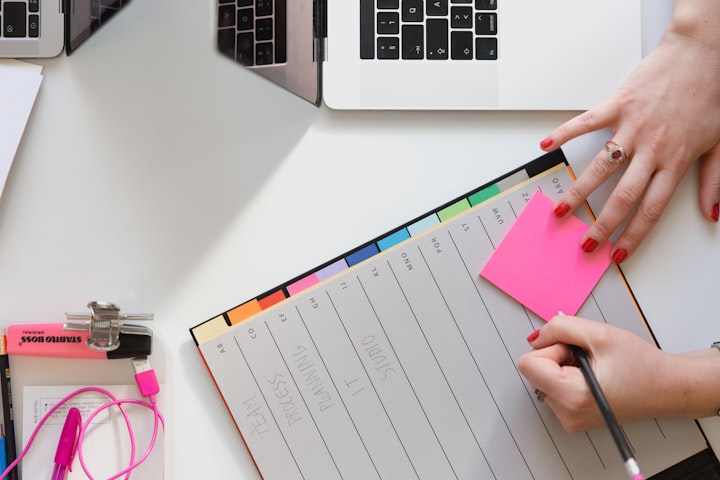
2019 was a long year. I graduated from college and moved to a big city, and I let the stresses of my 9-5 job and my status as a new adult push me to my limits. But as 2019 drew to a close, and I was able to find some more stability, a few lessons about managing stress came to the forefront of my mind.
1. Listen to yourself.
One reason you're probably burnt out and stressed 24/7 is because you're not getting in touch with your emotions. You probably remain stressed all day at work and then go home and watch TV until you have to go to sleep—you get into a cycle where you're productive all day and then you fill your free time at night with entertainment without taking any time to reflect and consider what you're feeling.
Try journalling every night for just ten minutes, and you may be surprised how long you actually end up journalling from night to night. Once you start, it may be hard to stop.

2. Focus on taking care of yourself physically.
The number one thing you can do when you recognize that you're burnt out is to focus as much of your time and effort on taking care of your physical health. You've reached the point of burnout and run yourself into the ground because you haven't cultivated habits that allow you to properly manage stress. You're probably turning to food or alcohol or lashing out at your friends and family to alleviate stress, but all you're doing is feeding your body foods it doesn't need or putting the most important relationships in your life at risk.
Step back when you get the urge to do something you'll probably regret later and think about why you want to chug a soda or eat a pint of ice cream.
Additionally, the single best thing you can do initially is to get more sleep. You feel mentally and physically exhausted because you're probably simply exhausted. Push your bedtime up an hour and see how you feel a week later.
3. Set some motherfucking boundaries.
There are tons of ways that we abandon ourselves every day—we say yes when we want to say no, we offer help when we'll actually resent giving it, we eat things for temporary satisfaction even though they undercut the real goals we really want to achieve.
You've no doubt seen the images on Pinterest about how "No." is a complete sentence. Get used to saying it, and only say yes to things if you actually want to do them, and the idea of doing them excites you. Obviously, practice this within reason, but on your own time, and in your relationships, set boundaries so that you feel in control of your time, and your relationships only ever feel encouraging and joyful.

4. Do things that fill you up.
Think back to the things you loved as a kid, and make more time for them in your week. I used to love painting, and I took the time towards the end of 2019 to reconnect to that, and I found that painting is actually an incredible way to calm any anxiety that I might be feeling.
The biggest thing you can do to help your burn out is to make your rest time intentional. Don't just watch TV or nap if those won't make you feel good afterwards. Find the things that you feel more energized after having done them—exercising, creative projects, etc.—and go do those in your free time. You'll find more happiness in your day-to-day and you'll be able to bring more energy to the other areas of your life.
5. TURN OFF EMAIL NOTIFICATIONS.
Turning off your email notifications—even if you only do this on the weekend—will do wonders for your mental and emotional health. You'll spend less time picking up your phone, you can actually leave the office when you physically leave the office, and you get more uninterrupted time in your day to focus on what really matters to you. It's a win-win.

6. Check your diet.
This goes along with taking care of your physical health, but keep track of how you feel after each meal, snack, or night out for a week. Really take a look at how you feel emotionally, physically and mentally. I've ended up restricting the amount of alcohol I drink down to just once or twice a month, because I've noticed that I get pretty depressed for four or five days after I go out. I'd love to go out every weekend, but if I want to actually have the energy to work towards my goals before and after work and during my weekends, I need to avoid alcohol.
7. Audit your time management skills.
If you were one of those students that waited until the last 12 hours to write their final term papers, you will 100% bring those time management skills with you into adulthood. Whether you're working on a project in your 9-5 or a project for your personal goals, your future self with appreciate it if your present self just gets started as soon as possible—avoid stress in the future by doing whatever you can now to get that project off the ground.

8. Accept that you feel like shit.
You may be putting yourself under more pressure if you keep telling yourself how you SHOULD feel. Remove "should" from your vocabulary. You're allowed to feel however you do feel about the things that are happening in your life—and you probably do need to feel the emotions you've got going on right now to learn and grow. If you find "should" popping up in your words, get off social media, stop comparing yourself to others, and go do something that will fill you up.
9. Keep your space clean.
Your external space is just a physical manifestation of your mind—if your Mom also jokingly called you a "bag lady" when you were a teenager, because you would move from room to room with a bag filled with all your projects, then you understand the urge to always have things within reach at all times. However, when you have a whole apartment, you'll feel a whole lot better if you just find a place for each item in your space.

10. Set up systems.
If adult life and all the different things you have to juggle are stressing you out and making you feel as scatter-brained as you've ever felt before, set up systems and habits that will help you out. If you're constantly losing your keys, get a cute dish from Target, putting next to your door on a shelf or a little nightstand and, first thing when you get home, put your keys there. Once that becomes a habit, you will never have to search for your keys again barring any extreme deviations from your daily routine.
That just about covers the 10 things that 2019 taught me about managing stress. If you're in the thick of it right now, just know that this time will end, but until then, you just need to put in a little bit of extra effort now so that tomorrow-you is set up for an easier day than the last. Until next time.





Comments
There are no comments for this story
Be the first to respond and start the conversation.